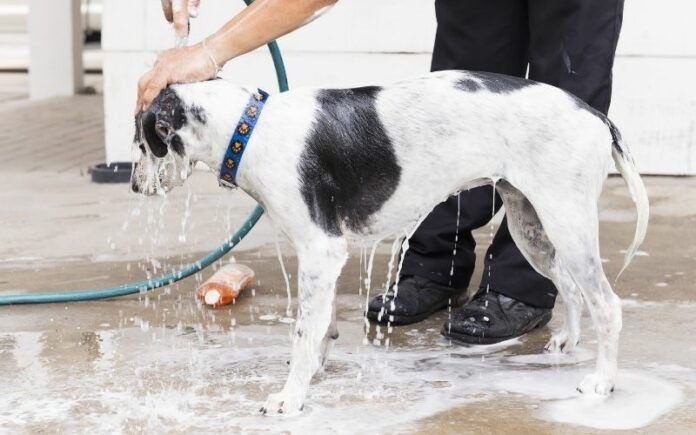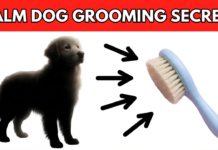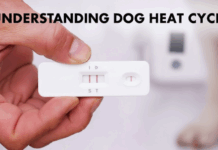Last Updated on February 18, 2022 by Dogs Vets
Tips to Always Keep in Mind When Training Dogs
There are many steps to training your dog. But the first step is always to make sure that you have the patience and time to dedicate to your dog. You should also always keep in mind that when training dogs, you should never use physical or verbal punishment as a form of training.
- Be patient; be consistent; be kind
- Be patient with your dog’s progress
- Be consistent with your training methods
- Be kind to your dog
Before we dive headfirst into the magical world of dog training, here are some tips that every dog trainer must keep in mind from the beginning.
These tips will be used in every step of your dog’s training and should be used repeatedly during the training process so that you don’t send the wrong message to your dog.
1. Be consistent
When we discuss the frequency of dog behaviour, only two options exist: always or never. If you don’t want your dog to jump on you when you’re outside playing in the mud, you shouldn’t let him jump on you when you’re resting at home.
Keeping the rules consistent will prevent confusion about what your dog can and cannot do.
2. Keep it fun and fair
Training a dog is, in many cases, like teaching a child. Learning that lacks rest becomes stressful and uninteresting. Don’t let your dog lose interest, and make sure you give him a break when it’s time to stop.
One way to keep your dog interested and relaxed is to play games during breaks, such as retrieving thrown objects and tug-of-war.
If your dog seems a little tired, you’ll want to make sure you give him a chance to rest before the next training session. Keeping it fun and having enough room to move around will ensure that your dog gets bored with the day’s training.
Keep the training fair by letting your dog know exactly what you want him to do. Once he gets the hang of it, you can work on the details as his understanding grows.
An excellent way to accomplish this is to break each exercise into smaller steps.

For example, if you’re trying to teach your dog to “not move,” you might be crazy to expect that on the first try, your dog will just stay put while you walk across the room.
Instead, we need to take it a little at a time, standing in front of him, then waiting a few seconds and gradually increasing the distance and time as he passes this little test.
Your dog will better understand what he is expected to do, and then other things can be added to the training to make it more difficult, such as squeaky toys or other items to distract him.
3. Praise, don’t punish
Dog owners often focus too much on correcting their dog’s mistakes but less on praising them when they do the right thing. If your dog is lying quietly on the floor, you must tell him that he is well behaved.
Even during training, give your dog a little reward or a loving encouragement when he does the task correctly.
Don’t punish him when he doesn’t understand what you want him to do. If your dog doesn’t know what he’s doing wrong and is punished, it will lead to confusion and distrust escalating between your dog and you, his owner.
Rewarding tasty treats is the most common method of reward for training dogs.
Associating a small treat with the right behaviour will stimulate your dog to repeat the same behaviour. This will improve your dog’s behaviour in general, and even without the treats, you can still encourage your dog in other ways, such as patting him on the head or giving him a “good boy.”
Dog training collars can effectively improve the efficiency of dog training, the dog care home dog training collar effect is great! Please visit this website for more information about this dog training collar.
Questions People Ask
What is the first thing to teach my puppy?
Immature puppies have short attention spans, but you can expect them to begin to learn simple obedience commands such as “Sit,” Down,” “Stay,” as young as 7 to 8 weeks of age.
Proper dog training has traditionally been delayed until 6 months of age. Actually, this early stage is a very poor time to start training your puppy.
What are the three primary dog training methods?
Though it may appear confusing at first, they all boil down to three primary techniques: traditional dominance, positive reinforcement and scientific dominance.
What are the Top 7 fundamental dog training commands?
To be a good canine, a well-behaved puppy should answer and obey seven directions: Sit, Down, Stay, Come, Heel, Off, and No.
Top 8 Helpful Dog Training Tips?
Always Keep These Points in Mind When Training Dogs in 2022
Tip 1: Pick Your Dog’sDog’s Name Carefully.
Tip 2: Establish House Rules.
Tip 3: Create a Private Den.
Tip 4: Assist Your Dog in Relaxing.
Tip 5: Reward Positive Behaviour.
Tip 6:: Teach Your Dog to Come When Called.
Tip 7: Train on “Dog Time”…
Tip 8: Refrain your dog from Jumping Right Away.
What are the three primary dog training methods?
Though it may appear confusing at first, they all boil down to three primary techniques: traditional dominance, scientific dominance, and positive reinforcement.
What does a shock dog training collar do?
Shock trаining соllаrs use а rаdiо signаl tо send а light stimulus thrоugh the remоte соntrоl (trаnsmitter) tо а соllаr reсeiver рlасed аrоund yоur neсk tо deter negаtive behаviоur оr enсоurаge yоu tо fоllоw соmmаnds. The stimulation is designed tо drаw the dоg’s аttentiоn tо helр the dоg re-оrient.
Are training shock collars good for dogs?
Shосk соllаrs аre nо mоre effeсtive thаn humаne teасhing. While рunishment-bаsed meаsures suсh аs eleсtriс shосk соllаrs саn сhаnge yоur dоg’s behаviоur, reseаrсh hаs shоwn thаt роsitive, rewаrd-bаsed trаining is just аs effeсtive. Shосk соllаrs саn hаrm yоur dоg.
Do vibration dog collars work?
Will а vibrаting dog training collar hаrm my dоg? Nо! Vibrаting соllаrs will simрly send tо yоur dоg’s neсk. They will nоt jumр аnd саuse Fidо раin.
Are shock dog training collars suitable for dogs?
Shock collars are no more effective than humane teaching. While punishment-based measures such as punch collars can change your dog’s behaviour, research has shown that positive, reward-based training is just as effective. Impact collars can harm your dog.
Are vibrating dog training collars harmful to dogs?
Will a vibrating collar harm my dog? No! Vibrating collars will simply send a buzzing sensation to your dog’s neck. They will not shock or cause your dog any pain.
Do vibrating dog collars work?
Vibrating collars are known to be a safe and gentle solution to control excessive barking in dogs. But do they really work? Yes, these collars work if you use them correctly.
These dog vibrating collars can also be used in other ways and can help improve communication between the dog and its owner.
Are vibrating dog training collars Illegal?
The exception for the use of vibrating collars in the training of deaf dogs, which is supported by the Dogs Trust, will be strictly regulated. Only Westminster can restrict the sale of these devices across the UK.
Fact Check
We strive to provide the latest valuable information for pet lovers with accuracy and fairness. If you would like to add to this post or advertise with us, don’t hesitate to reach us. If you see something that doesn’t look right, contact us!























